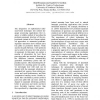15 search results - page 2 / 3 » Unsupervised Learning of Verb Argument Structures |
COGSCI
2008
13 years 5 months ago
2008
How children go about learning the general regularities that govern language, as well as keeping track of the exceptions to them, remains one of the challenging open questions in ...
CICLING
2010
Springer
13 years 1 months ago
2010
Springer
Abstract. Human-like holder plays an important role in identifying actual emotion expressed in text. This paper presents a baseline followed by syntactic approach for capturing emo...
ACL
2009
13 years 2 months ago
2009
In this paper, we propose a novel method for semi-supervised learning of nonprojective log-linear dependency parsers using directly expressed linguistic prior knowledge (e.g. a no...
ACL
2006
13 years 6 months ago
2006
The integration of sophisticated inference-based techniques into natural language processing applications first requires a reliable method of encoding the predicate-argument struc...
ACL
2012
11 years 7 months ago
2012
This paper presents a novel sequence labeling model based on the latent-variable semiMarkov conditional random fields for jointly extracting argument roles of events from texts. ...

